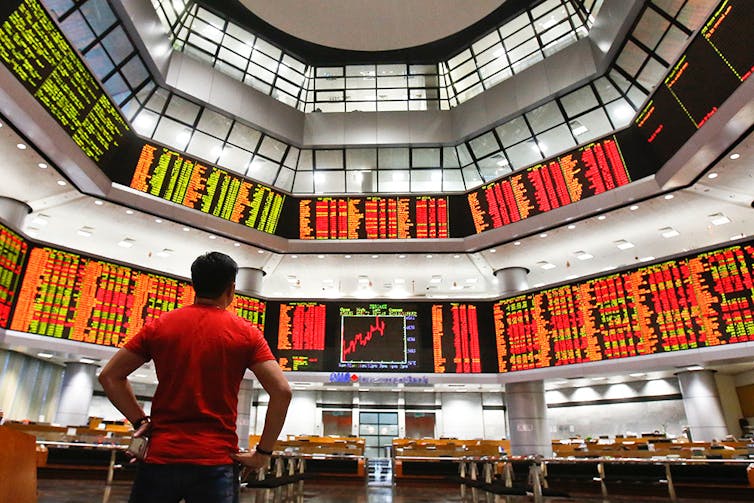Why does inflation make stock prices fall?
- Written by Richard S. Warr, Professor of Finance, North Carolina State University
Stock markets have been on a wild ride[1] recently, plunging one day and then soaring the next.
Pundits have offered many reasons[2] for the biggest stock market swoon in two years. One of the most frequently blamed culprits was the threat of inflation[3], which loosely means an increase in consumer prices over time.
That threat became a little more real after the latest data, released on Feb. 14, showed inflation in January[4] rising more than expected, sending stocks and bonds lower.
What would prompt something so seemingly banal to send investors into a state of craziness and even panic? A closer look at inflation – a topic I’ve studied closely[5] – and how it affects markets offers some answers. It also hints that an economic slowdown is closer than you may think.
What is inflation?
Inflation is defined as the rate of change in the prices of everything from a bar of Ivory soap to the costs of an eye exam[6].
 Better, worse, same? It’s all in the CPI.
Mega Pixel/Shutterstock.com
Better, worse, same? It’s all in the CPI.
Mega Pixel/Shutterstock.com
In the U.S., we measure inflation using something called the consumer price index[7]. Simply put, the CPI is the average price of a basket of goods and services that households typically purchase. It’s used throughout the economy, for example to set pay raises or to adjust benefits for retirees.
The CPI increased 0.5 percent in January from the previous month on a seasonally adjusted basis, more than economists had forecast and the most since September.
Over the previous 12 months, the index gained about 2.1 percent on a nonseasonally adjusted basis, meaning the price of most goods and services[8] rose by about that amount on average during the period. Some, such as hospital services, climbed at a faster pace[9] than the average (6 percent), while other categories rose more slowly or even declined, such as airline fares, which fell 5.1 percent.
Although inflation is still fairly low today[10], this hasn’t always been the case. In 1979, inflation exceeded 11 percent[11], a trend that persisted into the early 1980s.
Some observers[12] are now worried it’s about to start accelerating again.
The present value of money
So what spooks stock investors about inflation? To answer that, let’s examine the two ways inflation directly affects stock prices. The first concerns how we value future income.
When you purchase a stock, for example in Walmart or IBM, you are actually buying a long stream of future cash flows based on the profits of the company. The value of the company (and its stock price) is based on how much these future cash flows are worth today, a finance concept called “present value[13].” The present value of any sum of money expected to be collected in the future is computed by factoring in the impact of interest rates and inflation.
For example, let’s say you win the lottery and you’re offered either US$10,000 in a year’s time or $9,600 right now. What should you do? Well, if you’re acting rationally and you don’t have any urgent debts that need paying off, you would try to determine what that $10,000 is currently worth. To do so, you would divide it by 1 plus the interest rate you could readily get at a bank, let’s say 3 percent (we’re assuming that there is no inflation). So the present value of $10,000 a year from now would be $9,709 – which means it’s best to be patient and wait, rather than take the money now.
Now let’s imagine the same scenario but with inflation, which is expected to be 2 percent during the period. Inflation causes the bank rate to be 5 percent, and as a result that 10 grand is actually worth only $9,524 today. In which case, take the $9,600.
Because inflation made the “discount rate” higher, the value today of the future $10,000 was reduced. The same thing happens to stocks. Since a stock’s price is just the risk-adjusted present value of the company’s future cash flows, a rise in inflation will cause it to drop as well.
 When investors buy Walmart stock, they’re really buying the expectation that all these customers will keep coming back and generating cash flows in the future for the company.
AP Images for Walmart/Gunnar Rathbun
When investors buy Walmart stock, they’re really buying the expectation that all these customers will keep coming back and generating cash flows in the future for the company.
AP Images for Walmart/Gunnar Rathbun
Inflation’s flip side
A second way inflation directly affects stocks has the opposite effect. That is, it should cause them to increase in value.
Rising prices means companies are able to make more money from every computer game, sofa or pastry they sell. A baker, for example, who sold bread for $5 a loaf increases the price to $5.50 because of strong demand. While the cost of the flour and yeast may have also climbed at the same pace, the baker still makes more money because profit goes up too.
That leads to higher future cash flows and thus a higher present value today.These two effects of inflation should in theory cancel each other out. And yet stock prices are usually hammered[14] when inflation rises. So what’s going on?
There’s lots of evidence[15], including my own research[16], that many investors suffer from something called “inflation illusion.” They worry about the present value effect of inflation of stocks but they ignore the growth in cash flows and profits that result from higher inflation. This results in stock prices falling when they shouldn’t.
 Stock markets have been a sea of red lately.
AP Photo/Sadiq Asyraf
Stock markets have been a sea of red lately.
AP Photo/Sadiq Asyraf
Slowdown on the horizon
However, there’s a third, indirect way inflation affects stocks. And this might be what is causing the concerns in the markets today. This effect has inflation playing the role of a canary in a coal mine, warning that bad times are coming.
To understand this, we have to consider how inflation varies through the business cycle[17], which is a way of measuring the growth of the economy from the beginning of an expansion to the end of a recession.
At the beginning of a cycle, inflation is often low. (It was practically nonexistent or even negative[18] following the financial crisis of 2008.) But as the economy heats up and people have more money to spend (as is the case now), companies begin to sell more goods and services at steadily increasing prices, earning higher profits[19], while most people are able to find work[20].
As more stuff is being created and sold in the economy, the demand for raw materials and workers increases. Besides pushing up prices, this can also result in higher wages. The fastest increase in take-home pay in nine years was another “warning sign” that spooked investors[21] recently.
This is where we are now. If left unchecked, inflation could spike, which would likely cause the economy to slow down quickly and unemployment to increase. The combination of rising inflation and unemployment is called “stagflation[22],” and is feared by economists, central bankers and pretty much everyone else. It’s what can cause an economic boom to suddenly turn to bust, as we saw in the late 1970s.
This is where the Federal Reserve steps in. The U.S. central bank has the ability, through various tools, to manipulate short-term interest rates. So before the economic party gets out of hand and stagflation takes hold, the Fed steps in to calm things down by increasing the cost of borrowing in an effort to gradually slow the economy rather than let it crash and burn.
Think of the Fed as the sensible person telling everyone to go home at midnight instead of partying until the early hours. It’ll spoil the fun at midnight, but we’ll all be happier the next day.
Is the party over?
Back to the current turmoil. The latest CPI figures[23] suggest inflation may be accelerating, but it won’t be clear until we get a couple more readings.
For now, it’s mostly just the threat of inflation that’s causing trouble as investors begin to realize that the party is getting a little too crazy and that the Fed is going to step in and slow things down a bit. In other words, inflation is warning sign that an economic slowdown is coming – whether gradually executed by the Fed or abruptly by a spike in inflation.
So if all of this is understood, why did the market crash? Investors, naturally, want to stay at the party as long as they can. It is only when they see others heading for the exits that they realize maybe it’s time they left too, prompting a rush to the door. Thus the market tanks.
This is why a market can appear to be doing great and then suddenly fall at the first hint of inflation.
This is an updated version of an article originally published on Feb. 12, 2018.
References
- ^ have been on a wild ride (www.nytimes.com)
- ^ offered many reasons (www.theguardian.com)
- ^ threat of inflation (www.theguardian.com)
- ^ inflation in January (www.bloomberg.com)
- ^ I’ve studied closely (scholar.google.com)
- ^ Ivory soap to the costs of an eye exam (www.bls.gov)
- ^ consumer price index (www.bls.gov)
- ^ goods and services (www.bls.gov)
- ^ climbed at a faster pace (www.bls.gov)
- ^ still fairly low today (data.bls.gov)
- ^ exceeded 11 percent (www.minneapolisfed.org)
- ^ Some observers (www.msn.com)
- ^ present value (www.investopedia.com)
- ^ hammered (www.usatoday.com)
- ^ evidence (www.marketwatch.com)
- ^ research (www.jstor.org)
- ^ business cycle (www.nber.org)
- ^ nonexistent or even negative (www.thebalance.com)
- ^ higher profits (money.cnn.com)
- ^ most people are able to find work (www.reuters.com)
- ^ spooked investors (slate.com)
- ^ stagflation (www.investopedia.com)
- ^ latest CPI figures (www.bls.gov)
Authors: Richard S. Warr, Professor of Finance, North Carolina State University
Read more http://theconversation.com/why-does-inflation-make-stock-prices-fall-91874

